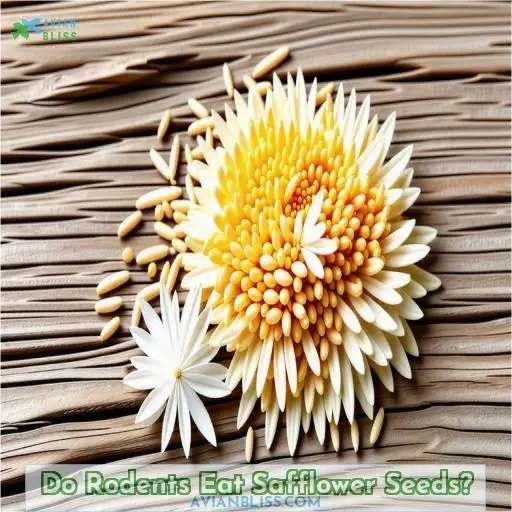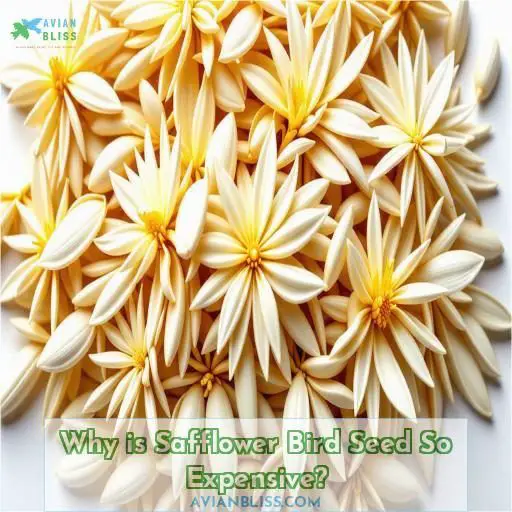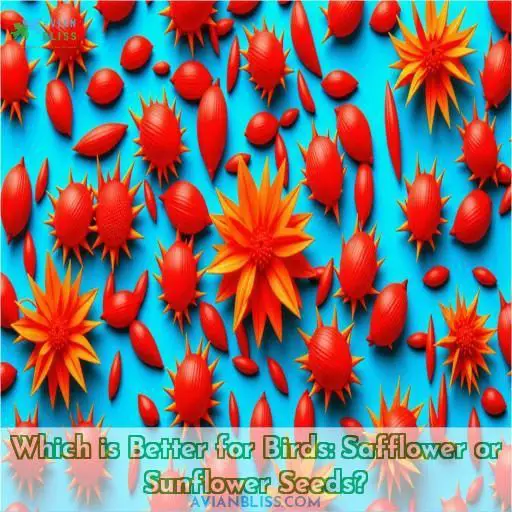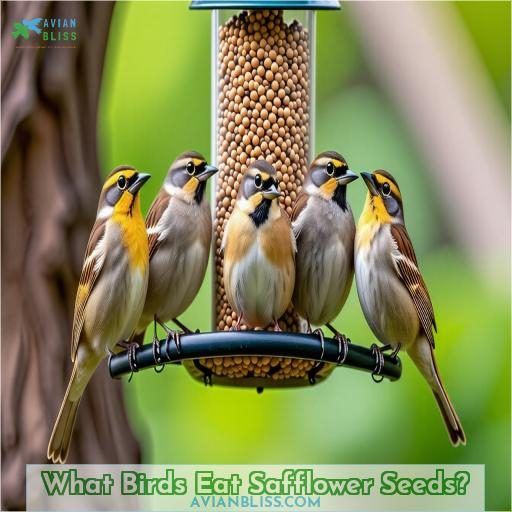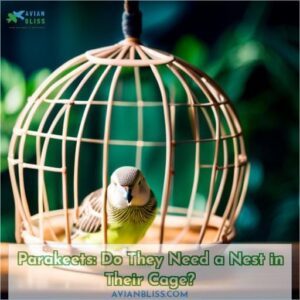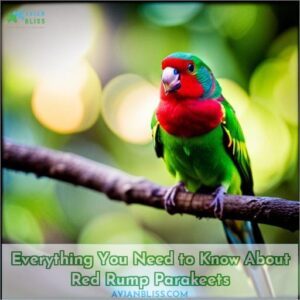This site is supported by our readers. We may earn a commission, at no cost to you, if you purchase through links.
 You’re wondering about safflower seeds, nature’s rodent-proof snack for backyard birds.
You’re wondering about safflower seeds, nature’s rodent-proof snack for backyard birds.
These tough-shelled seeds are like kryptonite to squirrels and rats, with a bitter taste they just can’t stomach. But for your feathered friends, safflower seeds are a nutritional goldmine packed with protein, fats, and essential vitamins.
Cardinals, grosbeaks, and titmice go nuts for them!
Sure, they’re pricier than basic bird seed, but their rodent-deterring prowess makes them worth every penny.
Want to keep those pesky varmints at bay while treating your avian visitors? Stick around to learn more tantalizing details about these rodent-resistant delicacies.
Table Of Contents
- Key Takeaways
- Do Rodents Eat Safflower Seeds?
- Why is Safflower Bird Seed So Expensive?
- Which is Better for Birds: Safflower or Sunflower Seeds?
- What Birds Eat Safflower Seeds?
- Frequently Asked Questions (FAQs)
- Do rodents eat safflower seeds?
- Why is safflower bird seed so expensive?
- Which is better for birds safflower or sunflower seeds?
- What birds eat safflower seeds?
- What types of birds eat safflower?
- Why are safflower bird seeds expensive?
- Do rodents eat safflower seeds?
- Is safflower or sunflower seed better for birds?
- What birds eat safflower seeds?
- Conclusion
Key Takeaways
- Safflower seeds are a nutritious and rodent-resistant option for backyard bird feeders, deterring unwanted pests while providing a high-protein, high-fat food source for birds.
- The tough outer shell and bitter taste of safflower seeds make them less appealing to rodents compared to other bird seed varieties, making them an effective deterrent.
- Safflower seeds are more expensive than other bird seeds due to their specialized production process and limited supply, reflecting the higher costs and demand for this niche crop.
- While some birds, such as cardinals and grosbeaks, readily consume safflower seeds, others like finches and sparrows may prefer the more accessible and palatable sunflower seeds.
Do Rodents Eat Safflower Seeds?
Are rodents a nuisance at your bird feeders, raiding the seed supply? You’ll be glad to know that safflower seeds are an excellent choice for deterring these unwanted guests while providing a nutritious feast for your feathered friends.
Safflower Seeds and Rodents
Safflower seeds are generally not preferred by rodents due to their tough outer shell, making it difficult for rodents to access the edible kernel inside. This inherent resistance to consumption makes safflower seeds an ideal choice in bird feeding scenarios (Source). The rodent resistance of these seeds is attributed to the hard outer shell, which deters rodents from consuming them .
Rodent Deterrence
Safflower seeds’ tough shells and bitter taste make them less appealing to rodents compared to other seeds.
This makes safflower an excellent choice for bird feeders, as it helps deter unwanted rodent visitors.
However, the higher cost and storage risks associated with safflower should be considered when selecting bird seed.
Why is Safflower Bird Seed So Expensive?
Safflower seeds are relatively expensive compared to other bird seeds due to their specialized production process and high demand. Their unique properties, including being less appealing to rodents, make them a sought-after choice for backyard bird enthusiasts.
Production Costs
Safflower seeds are more expensive to produce due to their:
- Lower yield per acre compared to other crops (Source)
- Specific growing conditions required, limiting production areas
- Labor-intensive harvesting process, increasing costs
As a result, safflower seed prices are higher than many other common bird seed varieties, reflecting the increased production costs and limited supply.
Demand and Scarcity
The limited supply and high demand for safflower seeds drive up their cost for bird seed manufacturers and consumers. Safflower isn’t as widely cultivated as sunflower, resulting in a more scarce and expensive product. This scarcity, combined with the higher production expenses, contributes to the premium pricing of safflower bird seed.
| Safflower Seed Availability | Safflower Seed Production |
|---|---|
| Limited supply | Higher costs |
| Niche crop | Smaller scale |
| Safflower Seed Popularity | Safflower Seed Cost Variance |
| — | — |
| Growing demand | More expensive than sunflower |
| Preferred by many birds | Reflects supply and demand |
Which is Better for Birds: Safflower or Sunflower Seeds?
When comparing safflower seeds to sunflower seeds for backyard birds, it’s important to take into account their nutritional profiles and the preferences of the bird species you wish to draw in. Safflower seeds have a slightly higher protein and fat content, while sunflower seeds provide more readily available energy, making each seed type valuable for different bird feeding goals.
Nutritional Profile
Safflower and sunflower seeds have similar nutritional profiles, providing birds with:
- High-quality protein for muscle growth and repair
- Beneficial fats for energy and insulation
- Essential vitamins and minerals for overall health
While sunflower seeds are slightly higher in fat, safflower seeds offer a unique bitter taste that deters rodents, making them a rodent-proof option for feeding backyard birds. Both seeds are excellent choices for supporting avian health and essential well-being
Preference and Consumption
Regarding taste comparison and preference, many birds, especially smaller songbirds, tend to favor the accessibility and flavor of sunflower seeds over safflower. However, safflower may be a suitable alternative for birds with sensitivities to sunflower. Consider factors like nutritional value, allergic reactions, and seed availability when deciding between these seeds. Some birds have shown a preference for sunflower due to its taste and ease of access.
| Preference | Nutritional Value | Health Benefits |
|---|---|---|
| Sunflower Seeds | High in fat and protein | Source of energy |
What Birds Eat Safflower Seeds?
Safflower seeds are a favorite among many backyard birds, such as cardinals, grosbeaks, and titmice, who relish the seeds’ thick shells and nutritious meat. However, some birds like finches and sparrows may prefer sunflower seeds over safflower due to the latter’s harder shells and slightly bitter taste.
Common Safflower Seed Eaters
Safflower seeds are a favorite among many backyard birds, including cardinals, grosbeaks, finches, sparrows, chickadees, and titmice. These birds are attracted to the seeds’ high-fat, high-protein content, making them a nutritious and energy-rich food source. Safflower’s bitter taste and hard shells deter squirrels and other rodents, ensuring the seeds are available for birds to enjoy.
- Safflower seeds are a high-protein, high-fat food source for birds.
- Many common backyard birds, such as cardinals and finches, enjoy safflower seeds.
- Safflower’s unique taste and texture make it unappealing to squirrels and rodents.
Less Preferred by Some
Concerning safflower seeds, some birds are less enthusiastic due to their tough outer shell. While smaller birds like chickadees and nuthatches may readily consume safflower seeds, larger birds like jays and blackbirds tend to prefer easier-to-access seeds. This preference can be influenced by factors such as taste preferences, nutritional differences, and availability affected by habitat and climate. (Source)
Rodent Resistance
Safflower seeds are a rodent-resistant feast for backyard birds. Their tough outer shell and bitter taste make them less appealing to squirrels, mice, and rats. Plus, safflower’s high nutritional value and accessibility in feeders make it a preferred choice for many bird species. This environmentally-friendly seed helps deter pesky rodents while attracting your feathered friends.
Deterring Rodents
Safflower seeds are a savvy choice for deterring rodents from your backyard bird feeders. Their tough shells and lack of appeal to mammals make them a rodent-resistant option. Plus, many beloved songbirds like cardinals, finches, and chickadees readily enjoy feasting on safflower. To further deter rodents, consider these 4 tips:
- Use feeders with weight-sensitive perches to restrict access.
- Hang feeders away from jumping points like trees or fences.
- Clean up spilled seed promptly to remove attractants.
- Sprinkle cayenne pepper or hot sauce on seed to repel rodents.
Frequently Asked Questions (FAQs)
Do rodents eat safflower seeds?
You’re right to wonder, rodents aren’t fans of safflower seeds. These oil-rich seeds are mainly enjoyed by birds like cardinals and finches. However, if you’re dealing with pesky rodents in your yard or home, safflower seeds won’t attract them like birdseed mixes might.
Why is safflower bird seed so expensive?
You’re paying a premium because safflower seeds are nutrition-rich yet low-cost to produce in the bird seed market. Their exclusivity for feathered friends makes them a coveted offering.
Which is better for birds safflower or sunflower seeds?
For birds, sunflower seeds are generally better than safflower. Sunflowers provide more energy and nutrition. However, safflower’s tough shells make them ideal for larger birds like cardinals.
What birds eat safflower seeds?
You’ll find cardinals, grosbeaks, and finches relishing the nutritious oil and protein in safflower seeds. These small birds easily crack open the thin shells to access the prized kernels.
What types of birds eat safflower?
Picture a rare bird oasis: only the elite, with their dazzling yellow plumage, feast on safflower seeds. Cardinals, grosbeaks, and finches make up this exclusive club.
Why are safflower bird seeds expensive?
Safflower seeds are pricier because their thick shells require specialized machinery for hulling and processing, driving up production costs.
Do rodents eat safflower seeds?
You’re right, rodents do enjoy munching on safflower seeds. Just imagine a furry little mouse scampering over to your bird feeder for a tasty snack! To deter unwanted guests, investing in a quality rodent-proof feeder is wise.
Is safflower or sunflower seed better for birds?
For birds, sunflower seeds are a better choice. They’re higher in fat and protein, making them more nutritious. Safflower seeds work too, but mainly for ground-feeding birds.
What birds eat safflower seeds?
You’d be amazed at the birds that flock for safflower seeds! Cardinals, grosbeaks, and finches particularly relish these nutrient-rich treats that satisfy their cravings.
Conclusion
Ultimately, safflower seeds’ bitter taste deters rodents while appealing to various bird species, making them a valuable addition to your backyard feeders. By incorporating these nutritious, rodent-proof treats, you’ll attract delightful avian visitors like cardinals and grosbeaks while deterring unwanted pests. Safflower seeds provide an effective solution for enjoying nature’s feathered friends without pesky rodent problems.

